The Arkansas Board of Education on Thursday removed academic-distress labels from the Blytheville School District and from 10 schools across the state, including J.A. Fair and McClellan high schools in the state-controlled Little Rock district.
The Blytheville district and the 10 individual schools qualified for release from the state label when the Education Department staff determined that more than 49.5 percent of the students at the schools and in the district scored at proficient or advanced levels on state math and literacy tests averaged over three school years: 2013-14, 2014-15 and 2015-16. Until the results of the spring 2016 tests, the schools and district were below the 49.5 percent proficient threshold.
Schools and districts labeled as academically distressed are in jeopardy of state takeover or even the disbanding of the school or district if satisfactory student achievement gains aren't made.
Despite the removal of the distress label, several of the schools continue -- for the time being -- to be labeled as "priority schools" under a federal school-accountability system. As priority schools, they must report quarterly to the Arkansas Department of Education and otherwise work with the state agency staff to carry out school improvement plans in a manner similar to their obligations as academically distressed schools.
Blytheville-New Tech High, McClellan High and J.A. Fair High, for example, are labeled priority schools.
The state and federal accountability systems are based on different criteria but affect a significant number of the same schools.
Academic distress indicates that more than half of students at a school didn't achieve at a proficient levels on state tests over three years.
The priority label indicates that a school was among the 5 percent lowest-scoring schools on state exams in the recent past.
The federal accountability system is on the verge of being changed. The Every Student Succeeds Act of 2015 is replacing the federal No Child Left Behind Act of 2002.
School district leaders were happy Thursday to lose the "academic distress" label.
"Hallelujah and thank you!" Blytheville Superintendent Richard Atwill told the board after the vote ending the systemwide designation for his district.
The Blytheville district's three-year proficiency rate went from 45.9 percent in 2014 to a three-year proficiency rate of 49.257 percent in 2015 to 51.151 percent in 2016. Blytheville-New Tech High was also one of the 10 individual schools to lose the distress label.
Atwill told the board that his district had learned too many lessons to list in its efforts to raise student achievement, and that there had been "a way of life change for us in Blytheville.
"If you have a school or a district in academic distress, you have a school system problem. You take what you learn from the Department of Education and you apply that to your entire system," Atwill said. "The positive mindset of the adults -- that's where we had to begin in order for our children to be served," he said.
He assured the Education Board that the district will continue to "keep the pedal to the metal, and we aren't letting up on the gas."
Arkansas Education Commissioner Johnny Key praised the Blytheville district's work toward improvement, including a partnership with KIPP Delta Charter Schools Inc. and other organizations, and toward resolving conflicts regarding whether students could transfer across district lines to attend schools in neighboring districts.
Besides Little Rock's J.A. Fair and McClellan high schools and Blytheville-New Tech High School, the schools now released from academic distress are Belair Middle and Pine Bluff High schools in the Pine Bluff School District; Dermott High; Watson Chapel High; Mineral Springs High; Jacksonville Middle in the new Jacksonville/North Pulaski School District; and Little Rock Preparatory Elementary School, which is an open-enrollment charter school.
The percentages of students proficient at the schools for the three-year period range from 49.664 percent at McClellan to 54.613 percent at Watson Chapel High.
"Congratulations. This is a moment of celebration," Education Board Chairman Mireya Reith of Fayetteville said after the unanimous 8-0 vote on removing the school labels.
Key commended the educators in the schools, districts and at the Arkansas Department of Education for their success.
"This wasn't just about these schools getting off the list; it was about changing the dynamic for what they are delivering for their students," Key said.
Education Board member Diane Zook of Melbourne, chairman of the Education Board's special committee on academic distress, said the labels were beneficial to a school.
"I understand the stigma that a district might feel when they are labeled academically distressed," Zook said. "But I also realized without the label they didn't get the level of help that brought them to this point."
She noted that the 10 schools and the district will continue to receive services from the state Education Department's School Improvement Unit for the remainder of this 2016-17 school year. The special services, however, will drop off for the next school year -- unless the schools also are labeled as priority schools under the state's effort to comply with the federal accountability system.
Mike Poore, superintendent of the Little Rock School District, which was taken over by the state in 2015 because six of 48 schools were labeled as academically distressed, said part of downtown Little Rock "shook" when news broke that Fair and McClellan were recommended for removal from the list. Baseline Elementary was removed a year ago, leaving Hall High, and Henderson and Cloverdale middle schools on the list.
"It all gets down to teaching," Poore said about the improved achievement. "Great teachers make the difference," he said.
"Talking about teaching and leadership, the things that are changing in our schools and in other places -- it's about creating different sets of expectations," he said. "When you create different expectations, it kind of lets you break down some walls of 'Well, we've always done it this way,' and you start taking on new ways to approach things, and that enables the culture to change."
Mineral Springs High School was labeled academically distressed less than a year ago.
Curtis Turner, superintendent of the Mineral Springs district, said the state Education Department staff worked with the district and gave the district a lot of good advice in regard to the high school's label.
"Our staff has bought into it," Turner said. "I can assure you that the work that started some years ago will continue, and I think the best is yet to come for Mineral Springs. Thank you for removing us."
Kristi Ridgell, superintendent of the Dermott School District, where the seventh through 12th grade high school has been removed from academic distress, kept her reaction to the board's vote short.
"Hard work pays off," Ridgell said.
The group of 10 schools relieved of the label is the largest group removed to date from academic distress. Six schools were removed last year.
Calculating the three-year proficiency rates for schools and districts has been complicated by the fact that the state has administered three different tests in the past three years -- the Arkansas Benchmark and End of Course exams; the Partnership for Assessment of Readiness for College and Careers, or PARCC; and the ACT Aspire.
Annette Barnes, assistant commissioner for public school accountability, and Denise Airola, executive director of the Office for Innovation in Education and a consultant to the Education Department, described for the state Education Board on Thursday how the department; ACT Inc., the maker of the Aspire test; and the department's Technical Advisory Committee calculated the three-year proficiency rates in math and literacy.
The process boiled down to finding the points on the 2015 PARCC tests and 2016 Aspire tests that are comparable to what was considered the proficient achievement rates on the Benchmark and End of Course. exams, which were less difficult or rigorous
Another 13 schools and two school systems continue to be classified by the state as academically distressed for the 2014, 2015 and 2016 school years.
The school districts that continue to have schools classified as academically distressed have the right to appeal the designations over the next several weeks. The Board of Education will vote on the academically distressed classifications later this spring, Barnes said.
A Section on 02/10/2017

